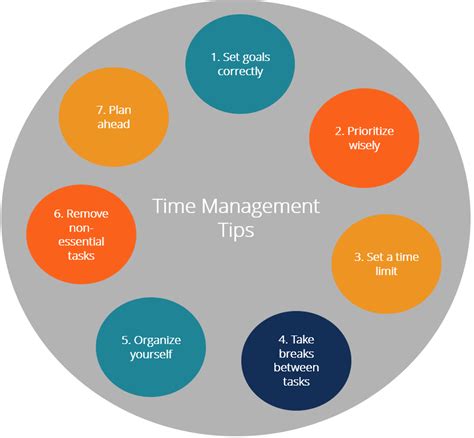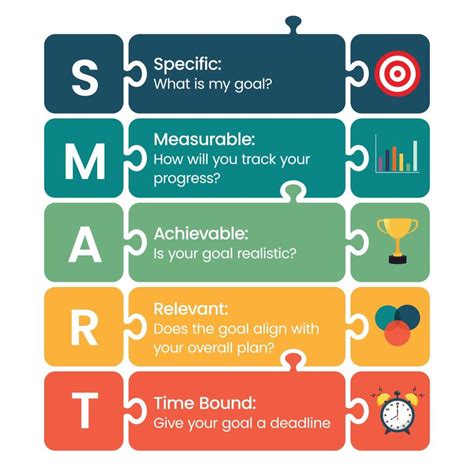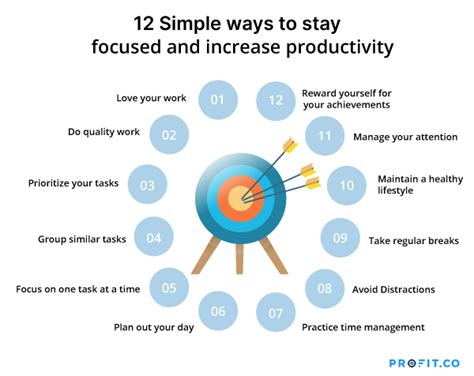Time management is a critical skill that can greatly impact your overall productivity and success in both personal and professional life. If you often find yourself struggling to meet deadlines, feeling overwhelmed by tasks, or constantly multitasking without achieving significant results, it's time to master the art of time organization. In this article, we will explore ten powerful techniques to help you optimize your time usage and boost your efficiency.
1. Prioritize ruthlessly: To effectively manage your time, it is crucial to discern between tasks that are important and those that are simply urgent. Focus on activities that align with your long-term goals and have a high impact on your success. Learn to say no to less important tasks or delegate them to others.
2. Plan strategically: Successful time management starts with careful planning. Set clear goals and break them down into manageable tasks. Create a daily, weekly, or monthly schedule to allocate time for each task. Be realistic about your capabilities and factor in some flexibility to handle unexpected challenges.
3. Eliminate distractions: It's easy to get sidetracked by social media, emails, or other trivial activities that consume precious time. Create an environment free from distractions by turning off notifications, silencing your phone, or utilizing time-blocking techniques. Train your mind to stay focused on the task at hand.
4. Embrace the power of routines: Establishing a structured routine can significantly improve your time management skills. Identify your peak energy periods and allocate them for tasks that require intense focus. Develop habits that help you start and finish tasks more efficiently and consistently.
5. Use technology wisely: Take advantage of the wide range of productivity tools and apps available to assist you in your time management journey. Utilize calendar applications to schedule events, use task managers to track your progress, and set reminders to keep you on track.
6. Delegate and collaborate: Recognize that you don't have to handle every task on your own. Learn to delegate responsibilities to others and leverage the power of collaboration. Effective communication and task distribution can save you time and allow you to focus on more critical aspects of your work.
7. Take regular breaks: Contrary to popular belief, taking regular breaks can actually enhance your productivity. Short breaks help refresh your mind, prevent burnout, and maintain your focus. Incorporate mini-breaks into your schedule and use them to relax, meditate, or engage in physical activities.
8. Continuously evaluate and adjust: Time management is a dynamic process that requires constant evaluation and adjustment. Regularly review your progress, identify areas for improvement, and refine your strategies accordingly. Be open to new approaches and adapt your habits to meet changing circumstances.
9. Practice effective communication: Enhance your time management skills by fostering clear and concise communication with others. Clearly define expectations, establish deadlines, and seek feedback to ensure efficient workflow and minimize misunderstandings.
10. Invest in self-care: Lastly, remember that effective time management is not solely about work. Taking care of your physical and mental well-being is crucial to maintain high productivity levels. Prioritize self-care activities such as exercise, proper nutrition, and sufficient sleep to rejuvenate yourself and stay motivated.
Planning Your Day: Strategies for Effective Time Management

In this section, we will explore practical techniques to optimize your daily schedule, allowing you to accomplish more in less time and enhance productivity. By implementing effective planning strategies, you can streamline your tasks, prioritize activities, and achieve your goals efficiently.
1. Organize Your Tasks: Create a comprehensive list of all the tasks you need to complete, categorize them based on their importance and urgency, and plan your day accordingly. |
2. Set Realistic Goals: Determine achievable objectives for each day and allocate sufficient time for their completion. By setting realistic goals, you prevent overloading your schedule and ensure a more balanced approach to time management. |
3. Prioritize Your Activities: Identify the most critical tasks that need immediate attention and focus on completing them first. Prioritizing your activities helps you make progress on essential assignments and reduces the risk of missing deadlines. |
4. Allocate Time Blocks: Create dedicated time blocks for specific activities or groups of tasks. By allocating defined periods for different types of work, you can maintain focus and improve efficiency. |
5. Minimize Distractions: Identify and eliminate potential distractions that may hinder your productivity. Reduce interruptions by turning off notifications, creating a quiet work environment, and setting boundaries with colleagues or family members. |
6. Delegate Responsibilities: Recognize tasks that can be delegated to others and allocate responsibilities accordingly. Delegating tasks not only frees up your time but also enables collaboration and enhances teamwork. |
7. Utilize Time Management Tools: Take advantage of various time management tools, such as digital calendars, task management apps, or project management software, to stay organized, set reminders, and manage your schedule effectively. |
8. Embrace Time Blocking: Implement the technique of time blocking, where you schedule specific time periods for particular tasks or activities. This method helps create structure in your day and facilitates efficient time allocation. |
9. Take Regular Breaks: Avoid burnout and maintain productivity by incorporating regular breaks into your schedule. Short intervals of rest can rejuvenate your mind, enhance focus, and prevent fatigue. |
10. Review and Adjust: Regularly review your time management strategies and assess their effectiveness. Identify areas for improvement, adjust your approach accordingly, and strive for continuous enhancement of your time management skills. |
Prioritize Tasks Based on Importance and Urgency
When it comes to managing your time effectively, it is essential to prioritize your tasks based on their importance and urgency. By prioritizing tasks, you can ensure that you focus on the most significant and time-sensitive activities, leading to increased productivity and efficiency.
To prioritize effectively, start by identifying tasks that are both important and urgent. These are tasks that require immediate attention and have a significant impact on your goals or deadlines. Prioritize these tasks at the top of your list and tackle them first.
Next, consider tasks that are important but not urgent. These tasks may not have immediate deadlines, but they contribute to your long-term goals and overall success. Allocate time to work on these tasks regularly, ensuring they receive the attention they deserve.
On the other hand, tasks that are urgent but not important should be carefully evaluated. These tasks may seem pressing, but they do not contribute significantly to your goals or objectives. Delegate or delete them if possible, as they can often waste valuable time and distract you from more essential tasks.
Finally, tasks that are neither urgent nor important should be deprioritized or eliminated altogether. These tasks are often time-wasters and can prevent you from focusing on what truly matters. Be mindful of these tasks and avoid giving them unnecessary attention.
By understanding the importance and urgency of your tasks, you can effectively prioritize your time and ensure that you allocate it to activities that will have the most significant impact on your success. Prioritization is a skill that, when mastered, can help you make better decisions, stay focused on important tasks, and ultimately manage your time more efficiently.
Establishing Clear and Attainable Objectives

Creating well-defined and realistic targets is crucial for effective time management. By setting clear goals, you provide yourself with a sense of direction and purpose, enabling you to prioritize tasks and allocate your time efficiently.
Developing specific goals helps clarify what needs to be accomplished. Synonyms for "clear" include explicit, definite, and precise. Similarly, "attainable" can be replaced with achievable, realistic, or feasible. Choose objectives that are challenging yet within reach, as overly ambitious goals can lead to unnecessary stress and frustration.
- Clearly define your objectives
- Establish deadlines for each goal
- Break larger goals into smaller, manageable tasks
- Prioritize tasks based on their importance and urgency
- Ensure your goals align with your broader aspirations
By setting clear and attainable goals, you can improve your time management skills, enhance your productivity, and ultimately achieve greater success. Remember to review and adjust your objectives regularly to stay on track and adapt to changing circumstances.
Dividing Tasks into Manageable Portions
One effective strategy for enhancing your ability to control and allocate your time wisely is to break down your tasks into smaller, more manageable segments. By dividing your responsibilities into smaller components, you can make them less overwhelming and easier to approach.
Segmentation Dividing tasks Partitioning | By segmenting your tasks, you can focus on one part at a time, allowing you to give your full attention and effort to each segment. This approach enables you to enhance your productivity by avoiding the feeling of being overwhelmed by an entire task or project. |
Efficiency Effectiveness Optimization | Breaking tasks into manageable chunks allows you to streamline your workflow, making it easier to identify and eliminate any activities or steps that are not essential. This optimization of your process enables you to complete tasks more efficiently and effectively, enhancing your overall time management skills. |
Progress Milestones Achievements | Dividing tasks into smaller portions provides you with a sense of accomplishment as you complete each segment. These milestones not only boost your motivation and confidence but also allow you to track your progress towards completing the entire task, making it easier to stay focused and motivated. |
Overall, breaking tasks into manageable chunks contributes significantly to improving your time management skills as it facilitates focus, enhances efficiency, and provides a sense of progress and achievement throughout your work. By adopting this approach, you can effectively tackle your responsibilities and make the most out of your available time.
Avoid Multitasking and Concentrate on One Task at a Time

In today's fast-paced world, the ability to manage our time efficiently is crucial for success. One effective strategy for improving time management skills is to avoid the temptation of multitasking and instead focus our attention on one task at a time.
Multitasking, often seen as a badge of honor in our society, may seem like an efficient way to tackle multiple tasks simultaneously. However, research has shown that multitasking can actually decrease productivity and lead to more mistakes.
When we try to juggle multiple tasks at once, our attention becomes divided, making it difficult to fully concentrate on any one task. This divided focus can result in decreased efficiency and increased stress levels.
Instead of trying to do everything at once, it is more effective to prioritize our tasks and allocate dedicated time to each one. By focusing on one task at a time, we can give it our full attention and energy, increasing our ability to complete it successfully.
When we concentrate on a single task, we enter a state of flow, where our productivity and creativity can thrive. By avoiding distractions and immersing ourselves fully in the task at hand, we can achieve a higher quality of work and feel a greater sense of accomplishment.
Furthermore, focusing on one task at a time also allows us to better manage our time. By allocating specific time slots for each task, we can create a structured schedule that improves our overall time management skills.
Developing the discipline to avoid multitasking may take time and practice, but the benefits are worth it. By prioritizing tasks, avoiding distractions, and giving our full attention to one task at a time, we can enhance our productivity, reduce stress, and ultimately improve our time management skills.
Learn the Power of Delegating and Outsourcing Responsibilities
Discovering the art of delegating and investing in outsourcing can be a game-changer when it comes to efficiently managing your time. By relinquishing certain tasks to capable individuals or specialized services, you can free up your valuable time and focus on more important aspects of your work or personal life.
Delegating involves entrusting specific responsibilities to others who possess the necessary skills and expertise. Whether it is assigning certain projects to team members or dividing household chores among family members, delegating allows you to distribute the workload and leverage the strengths of others. This not only lightens your own load but also provides an opportunity for others to develop their own skills and contribute to the success of the overall task.
Outsourcing, on the other hand, involves seeking external professionals or services to handle specific tasks or processes that are not within your area of expertise. From hiring virtual assistants to manage administrative tasks to contracting graphic designers for creating professional visuals, outsourcing can streamline your workflow and enable you to focus on the core aspects of your job or personal goals. It allows you to tap into the expertise of professionals while saving you time and effort, ultimately enhancing your overall productivity.
Learning to delegate effectively and identifying the right tasks for outsourcing requires careful consideration and trust in the abilities of others. It is essential to communicate clear expectations, provide necessary guidance, and maintain open lines of communication. By doing so, you can effectively utilize the power of delegation and outsourcing, benefiting both yourself and those involved in the process.
In summary, embracing the concept of delegating and outsourcing can significantly improve your time management skills. By recognizing the tasks that can be entrusted to others and seeking external expertise when needed, you can optimize your productivity and attain a more balanced and fulfilling lifestyle.
FAQ
How can I improve my time management skills?
Improving your time management skills can be done by following these top 10 tips: prioritize your tasks, set goals, create a routine, use time blocking, eliminate distractions, delegate tasks, avoid multitasking, take regular breaks, learn to say no, and use technology tools to help you stay organized.
Why is it important to prioritize tasks?
Prioritizing tasks is important because it allows you to focus on the most important and urgent tasks first. By prioritizing, you can ensure that you are making progress on your most crucial responsibilities and avoid wasting time on less important activities.
How can time blocking help improve time management?
Time blocking is a technique that involves allocating specific time blocks for different tasks or activities. This helps improve time management by providing a structured schedule, ensuring you allocate enough time for each task, and reducing the chances of getting distracted or overwhelmed.
Why should I delegate tasks to improve time management?
Delegating tasks can help improve time management because it allows you to distribute workload and responsibilities. By assigning tasks to others who are capable of completing them, you can free up time to focus on more important or higher priority tasks, ultimately increasing productivity and efficiency.
How can taking regular breaks improve time management?
Taking regular breaks is essential for improving time management as it helps prevent burnout and fatigue. Breaks allow you to rejuvenate, refocus, and maintain productivity throughout the day. By incorporating short breaks into your schedule, you can sustain your concentration and energy levels, resulting in better time management overall.







